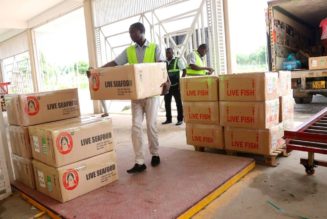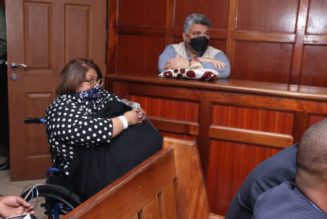Arts
Coloured Girls: Sisterhood finally finds solace in the ‘heaven within’
Friday January 19 2024

Kenyan casts, (Mbeki Mwalimu-Brown, Melissa Kiplagat-Yellow, Wanjiku-Victoria Seest-Orange, Nini Wacera-Purple, Marianne Nungo-Red, Tana Gachoka-Green and Rebecca Langley-Blue in the play, ‘For Colored Girls Who Have Considered Suicide When The Rainbow Is Enuf’ at SwahiliPot Hub in Mombasa County on December 7, 2023. PHOTO | WACHIRA MWANGI | NMG
It’s no wonder the Kenya-born Denmark-based thespian Michael Omoke chose to bring a special gift home after living abroad for so many years.
For Colored Girls Who Have Considered Suicide /When The Rainbow Is Enuf is one of the most acclaimed plays conceived and created, especially for women of colour. That has meant the play’s appeal has been, first and foremost, to women of colour all over the world who, as it turns out, have suffered similar challenges, abuses, and hardships, and identify with at least one of the seven women in the show.
For Colored Girls was created by the Black American poet and spoken-word performing artist Ntozake Shange. Its special, even revelatory appeal is in its ability to address intimate issues closely associated with African women, including racism, sexism, and sexual violence.
“I wanted to share a production that I felt would have relevance to Kenyan women,” Michael told the BD Life just before its premiere in Nairobi at the Signature Auditorium late last year, just days before he returned to Denmark.
“I also hoped it would raise issues and generate discussions that could be of interest to both men and women,” he added.
But Michael didn’t just identify a wonderful production to stage in Nairobi with support from the Embassy of Denmark and the European Union.
He also did serious research to identify seven outstanding female actors to co-star in the show. Six would be Kenyan although Wanjiku-Victoria Seest is based in Denmark while the seventh, Rebecca Langley, (also based there), has an impressive background in Danish theatre.
The five Kenyans are among our finest leading ladies, female dynamos who most Kenyans will know, either from film, TV series, or the stage.
They are Marrianne Nungo, Mbeki Mwalimu, Melissa Kiplagat, Nini Waceru, and Tana Gachoka. Altogether, they were seven awesome talents whose performance compelled me to go see them again the following Wednesday when they performed for students at the University of Nairobi’s Manu Chandaria Performing Arts Centre.
Omoka also sought out an African American director since he felt Cheryl J. Williams would be more attuned to the cultural nuances of the play than someone from a different culture who might not catch their significance or even see the subtleties. And sure enough, that was true, especially as Ntozake used lots of Black American equivalents to sheng in the script.
But even these cultural contrasts could not obscure the commonality of intimate concerns about sex that are rarely discussed publicly in Kenyan society. Yet these were part of the frank and funny conversations that came out in the poetic language of Ntozake.
There were many monologues in the show, but when one woman spoke, the others were attentive and responsive to the stories shared. There was one about supposed boyfriends who turn into rapists and even gang rapists, others who come, make promises, and then disappear having stolen (or trying to steal as in Nini Wacera’s case) your ‘stuff’.
But the most horrifying one came from the Lady in Yellow (Melissa Kiptagat) who told of her former lover and father of her two children. He beat her often and even hurt their children. But the most harrowing thing he did was try to blackmail her into marrying him since he believed marriage might cover him from the police. As a last resort, he grabbed her babies, dangled them outside an upstairs railing, and then threatened her, claiming he’d drop them if she continued to refuse him. When she said nothing, he let them go, dropping them to their death.
The horror of that moment seemed to hit the audience simultaneously, as we heard in their spontaneous collective gasp.
But that wasn’t the end of the play. There were still more issues to discuss. We could have stayed all night listening to them, but the play was steeped in so many shocking experiences that we were also hoping to hear about ‘the rainbow’ that was promised in the title of the play.
As it turned out, the rainbow came out in the end when the women showed their solidarity, both by embracing one another in their colourful rainbow-like garb and their shared expression of having found ‘God within’ themselves. They were no longer looking for fulfilment in a man or for Prince Charming to embody their fantasies. Now they’d found something that had always been there, they said. It was ‘heaven within’ themselves. For Coloured Girls was also staged in Kisumu, Mombasa as well as in Nakuru, and Eldoret.









